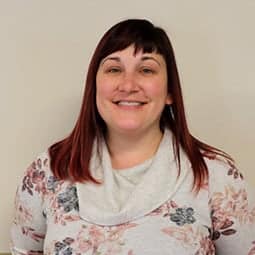
Annaliese is an early childhood educator for 13 years and current teacher at Educare Chicago, Start Early’s (formerly known as the Ounce) early education school. Originally from Ohio, she moved to Chicago in 2010 to pursue a teaching license and master’s degree in early childhood education from the University of Illinois at Chicago.
She is dedicated to helping her students start early. She enjoys teaching them to learn, play, problem solve and how to discover the world around them, sometimes all at the same time, while also learning side-by-side with them.
Recently, we sat down with Annaliese to discuss how being an educator has impacted her life and why she is passionate about working with communities most in need.
- Why is being an early childhood educator important to you?
Being an early childhood educator is very important to me. While some people think that I get to play with kids all day, and sometimes I do, it is fast-paced and changes day-by-day. I am constantly juggling information and goals from parents, emotions from the kids, lesson planning, looking at data, paperwork, documenting the kids work. It is exhausting to even think about the amount of work I get done in a day, both with the kids and the paperwork and meetings that happen during nap time.And we all know the studies, showing that the first five years of life are the most important at predicting outcomes later in life. This makes teaching this young group so important. The impact extends for all of life. I want to instill a love of learning and exploration and allow creativity and critical thinking to flourish. When you teach older kids, you have to worry about testing and district restrictions. Working in preschool allows you to integrate all developmental areas into studies, and I love that. Every day I get to discover and learn with my students, and that is what keeps me going.
- How has your experience as an educator impacted your life?
Being an educator has enlightened my whole life. Since my work is with young kids and having to know so much about development and watching kids develop so quickly, I have gained an appreciation for the way we all develop, throughout life. Even in my personal life, someone will ask me a question, and I’ll respond with, “Well, in Erickson’s Theory of Development…” I helped my partner learn to drive and thought about it like a teacher, like how can I “scaffold” how to parallel park?It has also opened my eyes to so many issues in the teaching field. Teaching is a profession that is made up of mostly women who are underpaid. Who work multiple jobs. Who spend their paychecks on their students. Who work over 40 hours a week. Who worry about their students at night and on the weekends. Who can’t afford childcare for their own children? And, some of us are working with and in traumatized communities. Traumatized by the government and the police. Working with families who don’t have stable homes or income. Families who worry about feeding their families and paying their meals. And it is hard when you work with these families and are one of these families, too. As a white woman, it is my duty to fight for these injustices and push for changes in the education field so that all teachers are supported and paid a living wage. I need to fight for more resources in the community I work in so that there is more equity in our world.
- Why should parents seek out high-quality early education programs for their children?
Right now, the parents in my classroom are applying to kindergarten for their children. They are stressed out and worried about their child getting into a good school. Getting into a good kindergarten is like getting into a good college. When you are a parent living on the South Side, where level one schools are few and far between, you are literally fighting for your child’s success. In order to get into a selective enrollment school, your child needs to be prepared for the selective enrollment test. Parents know their child needs to be in a high-quality preschool program to give them a foundation and skills to pass the test.Another point we remind parents is that school is more than just knowing your letters and counting to 100. Children need to know how to navigate the other side of school: being able to follow directions, control their emotions and work well with others. In my classroom, we focus a lot on these skills through role playing and problem solving. If a child cannot self-regulate than they won’t be able to sit quietly through a lesson in kindergarten. I think finding a balance of teaching and preparing these two components of school is a challenge that all early childhood educators face and when classrooms and programs can balance this, then high-quality care is happening.
- What advice would you give to a new educator coming into the early education field?
My advice to new educators is to make sure to take care of yourself. Go to counseling, get a massage, get your nails done, eat good food. If we cannot be there for ourselves then we will never be able to be there for our families and students. This is a difficult profession, and burn out is quick and easy. Create boundaries. Even if you are taking work home, either only do it through the week to leave your weekends open, or don’t do it during the week and spend a few hours on the weekend doing work. Just take care of yourself first and foremost.


